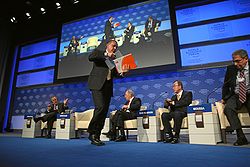The Presidency of Shimon Peres, the ninth President of Israel, began after the 2007 Israeli presidential election on 13 June 2007 in which Peres defeated Reuven Rivlin and Colette Avital. [1] Peres was sworn in as President on 15 July 2007. [2] and served until Reuven Rivlin was sworn in as his successor on 24 July 2014. [3]
Contents
- 2007 Presidential election
- Olmert Government
- Israeli Presidential Conference
- Address to the Grand National Assembly of Turkey
- Valley of Peace initiative
- Resignation of Ehud Olmert
- 2009 World Economic Forum
- Pope Benedict XVI's 2009 visit to Israel
- Netanyahu Governments
- 2009 Israeli Legislative Election
- Thirty-second government
- Thirty-third government
- Awards
- References
- External links
Peres was 90 years old when his presidency ended, which made him at the time the world's oldest head of state.





